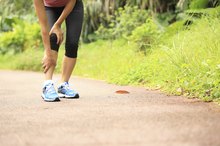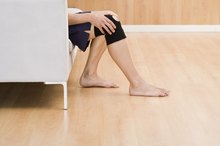How to Recover From Bad Running Leg Cramps
Leg cramps from running are typically caused by overuse, muscle strain or dehydration. Running too far too quickly and without sufficient training or warming up can quickly lead to thigh and calf cramps. Although most cramps are not serious, they may contribute to falls and other accidents, potentially putting you at risk for serious injury. Frequent cramps that do not respond to home treatment or prevention measures or that interfere with mobility require medical attention.
Stop running and move to a place you can safely rest and stretch. Walk home if you are outdoors, or sit down if you are running on a treadmill indoors.
How to Stop Leg Cramps When Playing Football
Learn More
Straighten the affected leg out in front of you, and pull your toes up toward your knee. This helps ease calf cramps, the most common location for cramps in athletes.
Massage a cramping leg muscle with gentle pressure to relax it and speed recovery from the cramp. If you notice increased pain, stop the massage immediately.
How to Treat a Hamstring Cramp
Learn More
Apply a cold compress directly to the affected muscle to reduce blood flow, prevent bruising and additional damage and relax the muscle. Leave the cold compress on for 15 to 20 minutes, and repeat every hour until the cramping is completely gone. Do not apply ice to bare skin; doing so can cause skin damage.
Soothe cramping leg muscles with a hot shower or bath once the primary cramp has passed. Allow the shower water to run against the affected muscles, or soak in a very warm tub for 15 minutes. A heating pad is also useful.
Drink plenty of water before, during and after exercise, and use a rehydration solution if you are sweating excessively or believe your leg cramps may be due to dehydration.
Take a non-steroidal anti-inflammatory medication, such as naproxen or ibuprofen, if lingering muscle soreness remains after your cramp subsides. If over-the-counter medications are not strong enough to control your pain, consult your doctor. Severe pain may indicate a muscle injury that needs professional treatment.
Rest the affected muscles until all pain is gone. This may take several days. In the meantime, you can continue to work other muscle groups. Return to running only when recovery is complete.
Tips
Do preventative exercises such as endurance training or plyometerics on the days you don't run -- these increase your conditioning and helps prevent the onset of neuromuscular fatigue that can cause muscle cramps.
Warnings
Cramping can be a symptom of more serious condition, such as diabetes or thyroid disease. Consult with your health care professional if your cramping is prolonged or consistent after each run.
Related Articles
References
- National Institutes of Health: MedlinePlus; Charley Horse
- Bupa: Exercise-induced Cramp
- Sports Health: Exercise-Associated Muscle Cramps
- Young G. Leg cramps. BMJ Clin Evid. 2015;2015
- Jahic D, Begic E. Exercise-associated muscle cramp-doubts about the cause. Mater Sociomed. 2018;30(1):67-69. doi:10.5455/msm.2018.30.67-69
- Waters TR, Dick RB. Evidence of health risks associated with prolonged standing at work and intervention effectiveness. Rehabil Nurs. 2015;40(3):148-65. doi:10.1002/rnj.166
- Skogar O, Lokk J. Pain management in patients with Parkinson's disease: challenges and solutions. J Multidiscip Healthc. 2016;9:469-479. doi:10.2147/JMDH.S105857
- Hallegraeff J, De greef M, Krijnen W, Van der schans C. Criteria in diagnosing nocturnal leg cramps: a systematic review. BMC Fam Pract. 2017;18(1):29. doi: 10.1186/s12875-017-0600-x
- Mcdermott MM. Lower extremity manifestations of peripheral artery disease: the pathophysiologic and functional implications of leg ischemia. Circ Res. 2015;116(9):1540-50. doi:10.1161/CIRCRESAHA.114.303517
- Blyton F, Chuter V, Walter KE, Burns J. Non-drug Therapies For Lower Limb Muscle Cramps. Cochrane Database Syst Rev 2012; 1:CD008496.
- Grandner MA, Winkelman JW. Nocturnal leg cramps: Prevalence And Associations With Demographics, Sleep Disturbance Symptoms, Medical Conditions, And Cardiometabolic Risk Factors. PLoS One 2017; 12:e0178465.
- Allen RE, Kirby KA. Nocturnal Leg Cramps. Am Fam Physician 2012; 86:350
- American Academy of Sleep Medicine. Sleep Related Leg Cramps. In: International Classification of Sleep Disorders, 3rd ed., American Academy of Sleep Medicine, Darien, IL 2014. p.299-303.
- Maquirriain J, Merello M. The Athlete with Muscular Cramps: Clinical Approach. J Am Acad Orthop Surg 2007; 15:425.
Writer Bio
Sandra Ketcham has nearly two decades of experience writing and editing for major websites and magazines. Her work appears in numerous web and print publications, including "The Atlanta Journal-Constitution," "The Tampa Bay Times," Visit Florida, "USA Today," AOL's Gadling and "Kraze Magazine."









